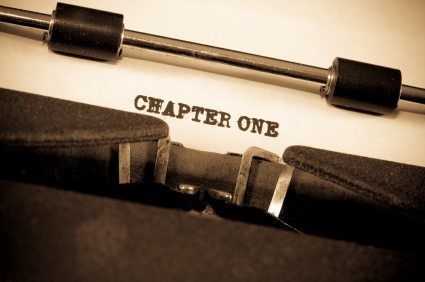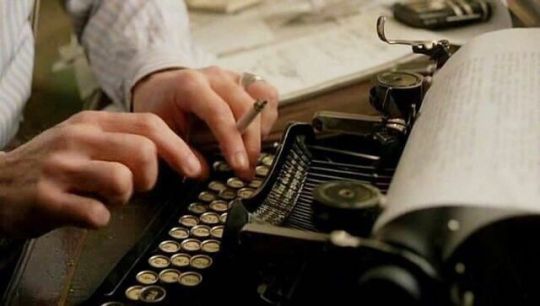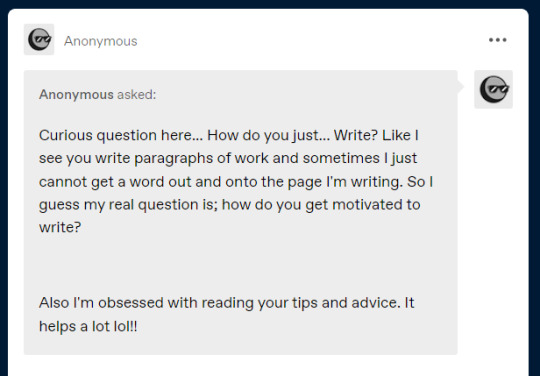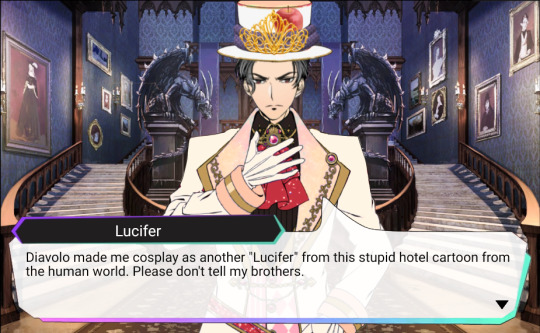Text
to you, it’s a shitty sentence. to some random bitch 500 miles away, it’s a fire line that’ll haunt them for the next 17 years.
you don’t know how impactful your writing is because it’s been in your brain for far too long now. you’ve stared at it for hours and repeated “this sucks” over and over again to the point that you killed your capacity to feel anything about your work.
but trust me, once you get your shit out there, someone’s gonna go over that paragraph you hate and go “jesus fucking christ” and put the book down to have an existential crisis.
39K notes
·
View notes
Text
Why Writers Don't Finish Writing Their Stories, and How to Fix It
Hello fellow writers and storytellers,
The journey of writing a story is an exhilarating adventure, but it's not without its share of obstacles. Many of us have embarked on a creative endeavor, only to find ourselves mired in the struggle to finish what we started. In this blog post, I'll unravel the common reasons why writers don't finish their stories and explore practical strategies to overcome these hurdles and reignite the flame of creativity.
The Perils of Unfinished Stories
As writers, we often find ourselves in the throes of unfinished tales, grappling with the intricate web of characters, plots, and themes. There are several reasons why the ink dries up and the story remains untold. Let's shine a light on the familiar adversaries that stand between us and the triumphant completion of our narratives:
1. Lack of Planning:
Some of us brazenly dive into our stories without a clear roadmap, resulting in uncertainty about the direction of the plot and the fate of our characters. The lack of a solid plan can lead us astray, leaving our stories wandering in the wilderness of aimlessness.
2. Self-Doubt and Perfectionism:
Ah, the relentless whispers of self-doubt and the siren call of perfectionism! These twin adversaries can cast a shadow over our creative vision, compelling us to endlessly revise and perfect the early chapters, trapping us in a whirlpool of perpetual edits.
3. Time Management:
Balancing the demands of daily life with the ardor of writing can be akin to walking a tightrope. The struggle to find consistent time for our craft often leaves our stories languishing in prolonged periods of inactivity, longing for the touch of our pen.
4. Writer's Block:
The mighty barrier that even the most intrepid writers encounter. Writer's block can be an insurmountable mountain, leaving us stranded in the valleys of creative drought, unable to breathe life into new ideas and narratives.
5. Lack of Motivation:
The flame that once burned brightly can flicker and wane over time, leaving us adrift in the murky waters of disillusionment. The initial excitement for our stories diminishes, making it arduous to stay committed to the crafting process.
6. Fear of Failure or Success:
The twin specters that haunt many writers' dreams. The apprehension of rejection and the unsettling prospect of life-altering success can tether us to the shores of hesitation, preventing us from reaching the shores of completion.
7. Criticism and Feedback Anxiety:
The looming dread of judgment casts a long shadow over our creative endeavors. The mere thought of receiving criticism or feedback, whether from peers or potential readers, can cast a cloud over our storytelling pursuits.
8. Plotting Challenges:
Crafting a cohesive and engaging plot is akin to navigating a labyrinth without a map. Faced with hurdles in connecting story elements, we may find ourselves lost in a maze of plot holes and unresolved threads.
9. Character Development Struggles:
Breathing life into multi-dimensional, relatable characters is a complex art. The intricate process of character development can become a quagmire, ensnaring us in the challenge of creating personas that drive the story forward. (Part one of Character Development Series)
10. Life Events and Distractions:
Unexpected events in our personal lives can cast ripples on our writing routines, interrupting the flow of our creativity and causing a loss of momentum.
Rallying Against the Odds: Strategies for Success
Now that we've confronted the adversaries that threaten to stall our storytelling odysseys, let's arm ourselves with strategies to conquer these barriers and reignite the flames of our creativity.
Embrace the Power of Planning:
A clear roadmap illuminates the path ahead. Arm yourself with outlines, character sketches, and plot maps to pave the way for your story's journey.
Vanquish Self-Doubt with Action:
Silence the voices of doubt with the power of progress. Embrace the imperfect beauty of your early drafts, knowing that every word brings you closer to the finish line.
Mastering the Art of Time:
Carve out sacred writing time in your schedule. Whether it’s ten minutes or two hours, every moment dedicated to your craft is a step forward.
Conquering Writer's Block:
Embrace the freedom of imperfection. Write, even if the words feel like scattered puzzle pieces. The act of writing can unravel the most stubborn knots of writer's block.
Reigniting the Flame of Motivation:
Seek inspiration in the wonders of the world. Reconnect with the heart of your story, rediscovering the passion that set your creative spirit ablaze.
Reshaping Fear into Fuel:
Embrace the uncertainty as an integral part of the creative journey. Embrace the lessons within rejection and prepare for the winds of change that success may bring.
Navigating the Realm of Criticism:
Embrace feedback as a catalyst for growth. Constructive criticism is a powerful ally, shaping your story into a work of art that resonates with readers.
Weaving the Threads of Plot:
Connect the dots with fresh eyes. Step back and survey the tapestry of your plot, seeking innovative solutions to bridge the gaps and untangle the knots.
Breathing Life into Characters:
Engage with your characters as if they were old friends. Dive into their depths, unraveling their quirks, fears, and dreams, and watch as they breathe life into your story.
Navigating Life's Tempests:
Embrace the ebb and flow of life. Every pause in your writing journey is a chance to gather new experiences and perspectives, enriching your storytelling tapestry.
The Ever-Resting Pen: Harnessing the Power Within
Fellow writers, the journey of completing a story is filled with peaks and valleys, each offering us the opportunity to sharpen our resolve and unleash our creative potential. As we stand at the crossroads, staring at the canvas of unfinished tales, let's rally against the odds, armed with the power of purpose, passion, and perseverance.
Let the ink flow once more, breathing life into tales left untold, and watch as your stories triumphantly reach their long-awaited conclusion. You possess the power to conquer the adversaries that stand in your way, and within you lies the essence of untold narratives waiting to unfurl onto the page.
Here's to the journey that lies ahead, the stories waiting to be written, and the unyielding spirit of creativity that thrives within each of us.
Warm regards and unwavering encouragement,
Ren T.
3K notes
·
View notes
Text
Want some easy tip to make your characters 100% more believable??
I learned this some time ago, and wanted to share it because it has really helped me A LOT.
Think of your characters and imagine how they would be in their best moment and in their worst. But not like, happiest and darkest moment. Think of it as their healthiest and most toxic moments. Everyone is healthy sometimes and toxic sometimes. USE THAT. Write a about it, describe them and their actions in both situations.
Maybe you have a character that can be crazy possessive when toxic, but really supportive when healthy. Who knows?
Once you write that, chances are you already know how their gonna behave in almost any situation that pushes them to be healthier/ more toxic. Plus, you can also use it for your characters' positive/ negative arc or to develop relationships with other characters.
Happy writing!! 😙😙
Other tips for writers: next
2K notes
·
View notes
Text
How to Write Sci-Fi Fantasy Books: Short Guide For Writers
Writing sci-fi fantasy books is an exciting journey into the world of imagination. It offers the author an opportunity to create new worlds, explore futuristic technologies, and delve into the complexities of magical systems. This blog post will guide you through the process of writing a compelling sci-fi fantasy book and help you avoid common pitfalls along the way.
Establish Your World
Your world is the stage on which your story unfolds. It needs to be richly detailed and logically consistent to make your readers believe in its existence. Start by defining the physical characteristics of your world, its history, culture, and societal norms. You can build your world from scratch or you can base it on existing real-world or fictional cultures. Remember, the world you create should serve your story and not the other way around.
Develop Your Characters
Characters are the heart of your story. They are the ones who make your readers care about what happens in your world. Your characters should be well-rounded, with their own strengths, weaknesses, hopes, and fears. You should know your characters inside out, including their backstories, even if it's not all revealed in the book. Also, remember that your characters don't have to be human. They can be aliens, magical beings, or sentient robots, to name a few.
Craft Your Plot
Your plot is the sequence of events that make up your story. It should be engaging, with conflicts and resolutions that keep your readers on the edge of their seats. Your plot should also be tightly woven with your world and characters. For instance, the challenges your characters face should be a direct result of the world you've created, and their actions and decisions should drive the plot forward. Also, don't forget to incorporate elements unique to the sci-fi and fantasy genres, such as advanced technology or magic.
Writing a sci-fi fantasy book is no easy task, but with careful planning and execution, it can be a rewarding experience. Remember to establish a solid world, develop compelling characters, and craft an engaging plot. Allow your imagination to soar, but also keep the rules of your world consistent. Lastly, enjoy the process and take pride in the unique world you've created. Happy writing!

220 notes
·
View notes
Text
Want quick tips to add instant chemistry to the relationships of your characters??
(🥳With examples🥳)
First of all, I want to say that you can also use most of them for platonic/ non-romantic relationships, so feel free to use this tips however you think they might work better in your story. So, without further adue, let's get to the tips!!!
Make your characters LISTEN to each other. Like, if A tells B they're not a morning person, B could make some coffee for A or lower the volume of their alarm.
This might sound quite obvious, but show that you characters care for each other. It might be as simple as one of them giving the other a glass of water when they feel a little dizzy, but it works wonders!
Make your characters physically close. When you are emotionally close to someone, you tend to be physically close too. But here is the thing. Make your characters react like it's second nature: "how would I not hug B when I haven't seen them in days?" or "Of course I'm gonna take A's hand when I feel insecure".
They don't have to be constantly thinking about each other, but when they do, MAKE IT MATTER!! For example, character A is out shopping, and they see B's favorite cookies. B didn't have a good day, and A knows that. But A also knows B is gonna fucking love the cookies, so they buy some.
Let them believe and trust each other. Also applies if one of them is a little distrustful: let your characters rely on one another, even if at the start they aren't as comfortable doing it. For a distrustful character, letting the other one help with chores might be a HUGE thing.
Other tips for writers: previous | next
3K notes
·
View notes
Text
how to go from daydream to draft:
begin by daydreaming as you normally do, or just after you've finished doing so. write down every thought you have. one after another. do not reread. do not stop for spelling mistakes. just dump out every thought. this is called stream of consciousness writing. you can do this for every scene you need a first draft for.
struggling to draft the scene? try to daydream about it. start thinking about how it would look, feel, what the characters would say, act it out in your head and then write out the stream of your thoughts as they arrive.
by now you have a few scene dumps. you may be tempted to go back and edit. do not do this expect for obvious spelling mistakes. do not read closely and start thinking "i need to rework this sentence." that is for later. now you're in the zone. draft more scenes. or work out what the next scene needs to be, scaffold it with a few comments. this will be the inspiration for your next deliberate thought stream that you will write out. repeat this process until you have the whole draft.
now that you have a draft or part of a draft you get to do this very fun thing called revise until you're happy. sweep through your draft with specific goals each time. one sweep to fix spelling/grammar. another for character voice. another for plot. repeat until you're happy with it.
leave it alone. just leave it for a bit. at least a few hours or days or even weeks. forget it exists. this will allow you come back with fresh eyes. then you can do your revisions with an eagle eye. now you may realize you need to add/remove scenes. you know how to get the first version down. close your eyes and daydream at your desk if that's what takes!
remember that fiction writing is persuasive writing. you are trying to persuade the reader to care about what happens next, the character's, the world, the feelings. as you're revising, consider whether you are persuaded. is the feeling/thoughts you wanted to provoke being felt by you when you read it? when working with beta readers, be sure to communicate what you're trying to convey so they can tell you if you've been successful or not.
this got a bit beyond getting the first draft done. hope you found it helpful.
bonus tip: check the spellings of names and places and other nouns that are not typically used, like the name of a magic tool!
4K notes
·
View notes
Text
The greater the conflict and more important the goal, the more tension the chapter will have.
1) a goal your pov character wants to achieve.
2) a conflict your pov character has to work through
Good pacing should build from smaller, more personal goals with minor conflict towards large goals with great conflict, before dropping back to lesser goals/conflict once more, but never to a point of lacking both goals and conflict.
credit:@brynwrites
105 notes
·
View notes
Text
If your plot feels flat, STUDY it! Your story might be lacking:
Stakes - What would happen if the protagonist failed? Would it really be such a bad thing if it happened?
Thematic Relevance- Do the events of the story speak to a greater emotional or moral message? Is the conflict resolved in a way that befits the theme?
Urgency - How much time does the protagonist have to complete their goal? Are there multiple factors complicating the situation?
Drive - What motivates the protagonist? Are they an active player in the story, or are they repeatedly getting pushed around by external forces? Could you swap them out for a different character with no impact on the plot? On the flip side, do the other characters have sensible motivations of their own?
Yield - Is there foreshadowing? Do the protagonist's choices have unforeseen consequences down the road? Do they use knowledge or clues from the beginning, to help them in the end? Do they learn things about the other characters that weren't immediately obvious?
credit:@cedar-west
3K notes
·
View notes
Text
Basic questions for your character
What is the character's full name? Any nicknames?
What is the character's date of birth?
Where was the character born and raised?
What is the character's cultural background?
What is the character's occupation? Are they like their job?
What are the character's hobbies or interests?
What is the character's favorite food? How often do they eat it?
What is the character's favorite music?
What is the character's favorite book? Quote?
What is the character's favorite movie?
What is the character's favorite place to visit?
What is the character's favorite color? Less favorite?
What is the character's greatest fear?
What is the character's greatest dream?
What is the character's most cherished memory?
What is the character's most painful memory?
What is the character's biggest regret?
What is the character's biggest accomplishment?
What is the character's relationship with their family?
What is the character's relationship with their friends?
What is the character's relationship with their romantic partner?
What is the character's relationship with authority figures?
What is the character's relationship with their community?
What is the character's relationship with their culture or heritage?
What was the character's childhood like?
What was the character's education like?
What kind of trauma has the character experienced?
What kind of romantic relationships has the character had in thepast?
What kind of friendships has the character had in the past?
What kind of enemies has the character had in the past?
What is the character's moral code?
What is the character's political stance?
What is the character's religious or spiritual belief?
What is the character's biggest flaw?
What is the character's biggest strength?
What is the character's sense of humor like?
What is the character's level of self-awareness?
What is the character's level of emotional intelligence?
What is the character's level of intelligence?
What is the character's level of creativity?
What is the character's level of physical fitness?
What is the character's favorite way to relax?
What is the character's favorite way to celebrate?
What kind of music does the character like to listen to when they're sad?
What kind of music does the character like to listen to when they're happy?
What does the character do when they're feeling overwhelmed?
What does the character do when they're feeling bored?
What does the character do when they're feeling angry?
What does the character do when they're feeling anxious?
What does the character do when they're feeling lonely?
If you want to read more posts about writing, please click here and give me a follow!

143 notes
·
View notes
Note
I don't know if you have ever done this type of genre before, so feel free to ignore this ask, but... Do you have any good tips or advice for writing horror stories? Like psychological and creepy stuff.
Love your blogs btw!! <3
Tips for writing horror stories
Awww, I love you guys too! Unfortunately, horror is not my strength, and I have never written a horror story before. I tried my best to write this, so if there is anything wrong, please tell me!
Tap into primal fears: Identify and explore universal fears that resonate with readers on a deep, primal level. Fear of the dark, fear of the unknown, fear of isolation, and fear of loss are all potent sources of horror.
Create suspense and tension: Build suspense by gradually escalating the stakes and creating a sense of impending doom. Use pacing, foreshadowing, and cliffhangers to keep readers engaged and on edge. You can also use short, consecutive sentences to create a sense of urgency and suspense.
Establish a chilling atmosphere: Set the tone and mood of your story through atmospheric descriptions. Utilize sensory details to immerse readers in a dark, foreboding, or eerie environment. Utilize the power of the unknown to create fear and anticipation. Sometimes what is unseen or left to the imagination can be more terrifying than explicit descriptions. Let the readers' minds fill in the gaps and create their own horrors.
Develop complex characters: Create well-rounded characters with their own fears, vulnerabilities, and flaws. Make readers care about them, and then subject them to terrifying or psychologically unsettling experiences.
Use psychological horror: Delve into the depths of the human psyche to evoke fear and unease. Explore themes such as paranoia, obsession, madness, or fractured perceptions of reality. Subtle, psychological twists can be just as impactful as overt scares.
Cultivate a sense of the uncanny: Take ordinary, everyday situations or objects and twist them into something sinister. This can create a stark contrast between the familiar and the horrifying, intensifying the impact on readers. Play with distorted reflections, doppelgangers, or seemingly ordinary objects that hold a sinister presence.
Leave room for interpretation: Allow readers to fill in the gaps and imagine the worst. Suggest horrors rather than explicitly showing them, leaving room for the reader's imagination to amplify the fear.
Build anticipation and reveal strategically: Tease and withhold information to keep readers engaged. Gradually reveal unsettling details or unveil the true nature of the horror at opportune moments for maximum impact. You can subvert their expectations and challenge their assumptions to keep them engaged and off-balance.
Explore taboo subjects: Fear can be evoked by exploring taboo or uncomfortable subjects that challenge societal norms. Use these themes tactfully and with sensitivity to create a disturbing effect.
Experiment with narrative techniques: Consider using different narrative perspectives to provide varying viewpoints and insights into the horror. First-person narratives can intensify the reader's connection with the protagonist, while third-person perspectives can offer a broader view of the unfolding terror. Use non-linear storytelling, unreliable narrators, or fragmented perspectives to create a sense of disorientation and psychological unease.
Study the genre: Read widely in the horror genre to understand different approaches and techniques. Analyze what works in other stories and adapt those techniques to your own writing style.
Edit with a critical eye: After completing your first draft, take the time to review and revise your work. Look for areas where you can heighten the horror, strengthen character development, or refine the atmosphere. Trim unnecessary details and ensure that each scene contributes to the overall sense of fear and unease.
If you want to read more posts about writing, please click here and give me a follow!

230 notes
·
View notes
Text
Writing a novel: Step by step
Most writers aspire to publish at least one book in their lifetime, but writing a novel is not easy. From new writers to experienced writers who have published hundreds of books, everyone must follow a step-by-step process to create their work. These steps are based on the wisdom of famous writers, so while they may not be entirely definitive, they will certainly be helpful to you.
Step 1: Generate ideas

Start by generating ideas for your novel. This can involve brainstorming, keeping a journal of potential story concepts, or drawing inspiration from real-life experiences, books, movies, or current events.
Once you get an idea, hone it.
Step 2: Create characters

A novel cannot be successful without unique and charming characters. Create compelling and well-rounded characters for your novel. Develop their backgrounds, motivations, personalities, and relationships. Consider their strengths, flaws, and how they will evolve throughout the story.
Remember, the more realistic the characters, the better the novel will be.
Step 3: Build setting

Establish the setting or world in which your novel takes place. Whether it's a real location or a fictional world, provide enough descriptive details to immerse readers and make the setting feel vivid and believable.
Step 4: Define plot and make an outline

What is your story about? How will it unfold? How does it begin, develop, and conclude? What and how many scenes will be included? Make an depth and very depth outline, even going so far as to outline every chapter.
Step 5: Write

Begin writing your first draft. Don't worry about perfection; the goal is to get the story down on paper. Embrace the creative process and let the ideas flow. Please remember, don't go back and make changes. Just write!
Step 6: Revise and edit

Once the first draft is complete, take a break (for 3 days) before revising and editing. (This will keep you from overediting or not editing enough.) Then, read through your manuscript with a critical eye, focusing on plot holes, inconsistencies, pacing, character development, and overall storytelling. Revise and rewrite sections as needed.
Step 7: Get beta readers

(You must) seek feedback from trusted individuals, such as beta readers, writing critique groups or your friends. Their input can provide valuable perspectives on areas that may need improvement. Consider their suggestions while maintaining your unique voice and vision for the story.
Step 8: Polish and refine

Polish and refine your novel based on the feedback received. Pay attention to sentence structure, grammar, punctuation, and overall prose. Ensure clarity and coherence in your writing.
Step 9: Publish

You can research different publishing options, such as traditional publishing or self-publishing. Remember to evaluate the pros and cons of each approach and decide which is the best fit for your goals and circumstances.
That's all. I hope you success in publishing your novel!!
If you want to read more posts about writing, please click here and give me a follow!

398 notes
·
View notes
Note
Miss Sophia, I have a question. Um, well first of all...
I actually like slice of life, fantasy, romance, horror, sci-fi.
But my question is... Ahem. How do you make romance scenes non cringy?
Becsaiw sometimes when I'm writing them, I cringe, and feel weird. Others, my my heart flutters.
How to make romantic scenes not cringe?
Well, honestly, for me, this question is so hard to answer... As my strength is romance, I can't give you any advice based on my experience. What I do when writing romantic scenes is simply… imagine and write. So, I searched the internet, read some articles and learned a few things. Hope it will help you.
Tip 1: Develop realistic and relatable characters

Ensure that your characters are well-rounded and have depth. Give them distinct personalities, flaws, and motivations that readers can connect with. This will make the romantic interactions more believable and engaging.
Tip 2: Show, don't tell

Instead of explicitly stating how characters feel, demonstrate their emotions through their actions, dialogue, and body language. How do they treat each other? How do they talk to each other? When one person is sick, what will the other person do? Are they shy or bold when meeting the person they love? The more details you tell, the more genuine the feelings between them will be.
Tip 3: Build emotional tension

Establish a strong foundation of emotional connection and chemistry between the characters. Develop their relationship gradually and create moments of anticipation and longing. This will make the romantic scenes more captivating and less cringe-worthy.
Tip 4: Prioritize consent and respect

Ensure that the romantic interactions include clear communication, mutual respect, and consent. Avoid any scenes that may promote unhealthy dynamics or non-consensual actions, as they can easily become cringe-worthy or uncomfortable for readers.
Tip 5: Use subtlety and restraint

Sometimes, less is more. Avoid over-the-top gestures or exaggerated romantic dialogue that can feel forced or insincere. Instead, focus on small, genuine, and meaningful moments that allow readers to connect with the emotions being portrayed.
Tip 6: Balance romance with other elements

Incorporate other elements such as humor, conflict, or character development alongside the romantic scenes. This will add depth and prevent the story from becoming overly focused on romance, which can sometimes lead to cringe-worthy moments.
Tip 7: Read romance novels

You cannot write a beautiful love story without reading any romance novels, unless you write it based on your own story. You can read famous works like Pride and Prejudice, Jane Eyre, Red, White & Royal Blue, or anything else that interests you, and learn how the characters interact with each other. This is the best way.
That's all. Good luck!

75 notes
·
View notes
Text
Common misfortunes for characters
Death of a loved one: This can be a profound and devastating experience for a character, leading to grief, guilt, and a sense of loss. It can also serve as a catalyst for character development and exploration of themes such as mortality, coping with loss, and the fragility of life.
Serious illness or injury: Physical or mental health challenges can test a character's resilience and force them to confront their limitations. It can also provide opportunities for exploring themes of perseverance, the importance of support systems, and the fragility of the human body.
Loss of a job or financial ruin: Financial struggles can lead to desperation, uncertainty, and a loss of identity for a character. It can also present opportunities for growth, reinvention, and exploring themes of resilience, resourcefulness, and the true value of material possessions.
Betrayal by a trusted friend or ally: Betrayal can shatter trust and lead to feelings of anger, betrayal, and a loss of faith in others. It can create complex moral dilemmas for the character and explore themes of loyalty, forgiveness, and the dark side of human nature.
Imprisonment or wrongful accusation: Being imprisoned or falsely accused can lead to feelings of powerlessness, injustice, and a struggle for redemption. It provides opportunities for exploring themes of justice, personal agency, and the lengths one will go to prove their innocence.
Natural disasters: Natural disasters can be catastrophic events that disrupt lives, challenge survival instincts, and test a character's resilience. They can explore themes of human vulnerability, the power of nature, and the strength of community in times of crisis.
War or conflict: War and conflict can have profound impacts on characters, leading to physical and emotional trauma, loss of loved ones, and moral dilemmas. They provide opportunities for exploring themes of heroism, sacrifice, the futility of violence, and the long-lasting effects of war.
Addiction or substance abuse: Characters grappling with addiction or substance abuse can experience a downward spiral, strained relationships, and a loss of control. It allows for exploration of themes such as self-destructive behavior, the road to recovery, and the impact of addiction on oneself and others.
Mental health issues: Characters dealing with mental health issues like depression or anxiety can face internal struggles, isolation, and difficulties in functioning. It provides an opportunity to delve into themes of stigma, self-discovery, and the importance of mental health support.
Loss of a child or miscarriage: The loss of a child or experiencing a miscarriage can be emotionally devastating for characters, leading to grief, guilt, and questioning of one's purpose or identity. It allows for exploration of themes of parental love, coping with loss, and the complexities of grief.
Failed relationships or divorce: Characters going through failed relationships or divorce can experience heartbreak, loneliness, and a sense of failure. It presents an opportunity to explore themes of love, forgiveness, personal growth, and the complexities of human relationships.
Alienation or social isolation: Characters who feel alienated or socially isolated can grapple with feelings of loneliness, rejection, and a sense of not belonging. It allows for exploration of themes of identity, acceptance, and the importance of human connection.
Identity theft or fraud: Characters who fall victim to identity theft or fraud can face financial ruin, loss of reputation, and a struggle to reclaim their identity. It provides opportunities to delve into themes of trust, deception, and the lengths one goes to protect their identity.
Accidental injury or disability: Characters experiencing accidental injury or acquiring a disability can face physical and emotional challenges, adjusting to a new way of life, and overcoming societal barriers. It allows for exploration of themes such as resilience, self-acceptance, and the meaning of true strength.
Loss of a treasured possession or heirloom: Losing a treasured possession or heirloom can evoke feelings of loss, nostalgia, and a connection to the past. It provides an opportunity to explore themes of materialism, attachment, and the value of intangible memories.
Being stranded or lost in a remote or dangerous location: Characters finding themselves stranded or lost in a remote or dangerous location can face survival challenges, fear, and the need to rely on their instincts. It allows for exploration of themes of resilience, self-discovery, and the inherent strength of the human spirit.
Struggling with poverty or homelessness: Characters experiencing poverty or homelessness can encounter hardships, discrimination, and a constant struggle for basic needs. It provides an opportunity to explore themes of social inequality, resilience, and the power of compassion and empathy.
Encounter with a dangerous or malicious antagonist: Characters facing a dangerous or malicious antagonist can be subjected to physical and psychological harm, manipulation, and a fight for their lives. It allows for exploration of themes of good versus evil, moral choices, and the strength of the human spirit in the face of adversity.
Political or social persecution: Characters experiencing political or social persecution can face oppression, injustice, and the fight for their rights and freedom. It provides an opportunity to explore themes of social change, courage, and the power of collective action.
Being framed for a crime they didn't commit: Characters who are framed for a crime they didn't commit can face wrongful accusation, a loss of trust, and the pursuit of justice. It allows for exploration of themes of innocence, perseverance, and the search for truth.
These misfortunes can be used individually or combined to create layered and complex narratives where characters face adversity, overcome challenges, and ultimately find strength and growth through their experiences. Remember to balance the misfortunes with moments of resilience, hope, and eventual triumph to create a compelling narrative.
If you want to read more posts about writing, please click here and give me a follow!

3K notes
·
View notes
Note
Hello!! I've been reading your blog for quite some time now, and it got me wondering... How do you write so easily? I have been finding writing hard, or actually getting into writing in general rather difficult. How do you just... Write? Or get motivated to write? Any tips or advice is helpful!! Thanks <3

Since these two questions are quite similar, I will answer them together in this article.
To be honest, it's quite difficult to answer the question of why I can write so easily clearly. I started writing at a very young age - when I was 8 years old, I began writing my first stories on paper (before that, I would compose them in my head). So, I became accustomed to transforming ideas into words and connecting them into paragraphs. As a child, I had numerous peculiar ideas, but since I couldn't draw them, I chose to write. Gradually, writing became a habit and a hobby for me.
I believe the reason I can write easily is the result of many years of practice. Writing has become second nature to me, just like a skilled craftsman easily creates a craft without needing as much time and effort as a beginner.
Of course, there are also moments when I can't write a single word. During such times, I mostly choose to ignore it and engage in other activities (lol) because I don't want to force myself to write. After all, writing is simply my hobby, not my job.
If you want to be motivated to write, I believe the best approach is to let your imagination run wild. When you have an idea, motivation will naturally follow. Additionally, it is beneficial to read a lot of books and practice your writing skills. It doesn't have to be limited to meaningful stories; you can write paragraphs describing people, scenes, or everyday experiences. By doing so, when you have an idea, you won't struggle to translate the thoughts in your mind into sentences on paper.
I hope you find enthusiasm in writing. If you have any questions, please feel free to send them to me!

29 notes
·
View notes
Text
HOW TO GIVE PERSONALITY TO A CHARACTER
Giving personality to a character is an essential part of character development in storytelling, whether you're writing a novel, screenplay, or creating a character for a role-playing game. Here are some steps and considerations to help you give personality to your character:
Understand Their Backstory:
Start by creating a detailed backstory for your character. Where were they born? What were their childhood experiences like? What significant events have shaped their life? Understanding their past can help you determine their motivations, fears, and desires.
2. Define Their Goals and Motivations:
Characters often become more interesting when they have clear goals and motivations. What does your character want? It could be something tangible like a job or a romantic relationship, or it could be an abstract desire like happiness or freedom.
3. Determine Their Strengths and Weaknesses:
No one is perfect, and characters should reflect this. Identify your character's strengths and weaknesses. This can include physical abilities, intellectual skills, and personality traits. Flaws can make characters relatable and three-dimensional.
4. Consider Their Personality Traits:
Think about your character's personality traits. Are they introverted or extroverted? Shy or outgoing? Kind or selfish? Create a list of traits that describe their character. You can use personality frameworks like the Myers-Briggs Type Indicator or the Big Five Personality Traits as a starting point.
5. Give Them Quirks and Habits:
Quirks and habits can make a character memorable. Do they have a specific way of speaking, a unique fashion style, or an unusual hobby? These details can help bring your character to life.
6. Explore Their Relationships:
Characters don't exist in isolation. Consider how your character interacts with others. What are their relationships like with family, friends, and enemies? These relationships can reveal a lot about their personality.
7. Show, Don't Tell:
Instead of explicitly telling the audience about your character's personality, show it through their actions, dialogue, and decisions. Let the reader or viewer infer their traits based on their behavior.
8. Create Internal Conflict:
Characters with internal conflicts are often more engaging. What inner struggles does your character face? These can be related to their goals, values, or past experiences.
9. Use Character Arcs:
Consider how your character will change or grow throughout the story. Character development is often about how a character evolves in response to the events and challenges they face.
10. Seek Inspiration:
Draw inspiration from real people, other fictional characters, or even historical figures. Study how people with similar traits and backgrounds behave to inform your character's actions and reactions.
11. Write Dialogue and Inner Monologues:
Writing dialogue and inner monologues from your character's perspective can help you get inside their head and understand their thought processes and emotions.
12. Consider the Setting:
The setting of your story can influence your character's personality. For example, a character who grows up in a war-torn environment may have a different personality than one raised in a peaceful, affluent society.
13. Revise and Refine:
Don't be afraid to revise and refine your character as you write and develop your story. Characters can evolve and change as the narrative unfolds.
Remember that well-developed characters are dynamic and multi-faceted. They should feel like real people with strengths, weaknesses, and complexities. As you write and develop your character, put yourself in their shoes and think about how they would react to various situations. This will help you create a compelling and believable personality for your character.
11K notes
·
View notes
Text

✨With the punch of a pentagram I wap bam boom alakazam✨
2K notes
·
View notes
Text

Depressed peacock vs angry snake
973 notes
·
View notes